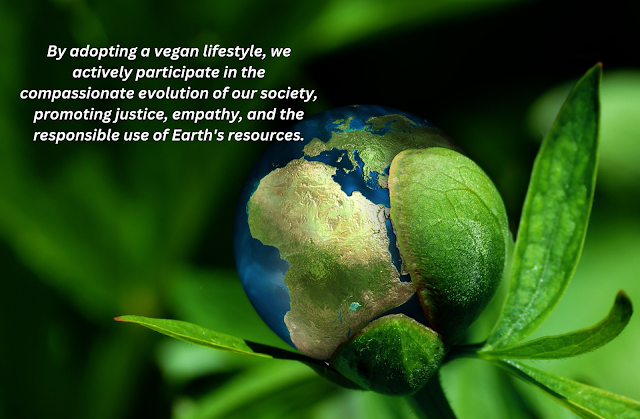Resourceism and Veganism: Shared Principles for Equitable Resource Distribution and Animal Rights
Resourceism and Veganism are two ideologies that share common ground in their goals of promoting equity, sustainability, and ethical treatment of all Earth's inhabitants. Resourceism advocates for the equitable sharing of Earth's resources for the benefit of all, while Veganism focuses on animal rights and the rejection of animal exploitation. This article explores the intersection between Resourceism and Veganism, highlighting how they align in their principles and values.
By adopting a vegan lifestyle, we actively participate in society's compassionate evolution, promoting justice, empathy, and responsible resource use. Veganism challenges the exploitation of animals, advocating for their rights and recognizing their capacity for emotions. It fosters empathy by deepening our understanding of their experiences. Moreover, veganism contributes to the responsible use of Earth's resources by reducing the ecological footprint associated with animal agriculture. It is a powerful way to promote a more compassionate and sustainable society.
Understanding Resourceism: Equitable Resource Distribution for All Resourceism, as defined by its proponents (www.resourceism.com), is the belief that all of the Earth's resources are the common inheritance of all its inhabitants and should be shared equally. It recognizes the importance of sustainable resource use and advocates for a socio-economic system that ensures equitable distribution and access to resources. This approach encompasses humans and extends to include animals as valued inhabitants of our planet.
Veganism: Advocating for Animal Rights and Resource Equality Veganism, grounded in ethical considerations and animal rights, aligns with the values of Resourceism. By embracing a vegan lifestyle, individuals actively work towards eliminating animal-based resource use, such as animal agriculture and exploitation for various purposes. Veganism challenges the notion that animals are mere resources by promoting compassion, respect, and the recognition of animals' inherent rights to live free from harm and exploitation.
Environmental Sustainability: Resourceism and Veganism recognize the urgent need for sustainable practices to protect our planet's resources. Resourceism encourages responsible resource management and sustainable development, while Veganism promotes plant-based diets and the reduction of animal agriculture, a major contributor to environmental degradation, deforestation, and greenhouse gas emissions.
Ethical Considerations: Both ideologies place a strong emphasis on ethics and moral values. Resourceism recognizes the intrinsic value of all living beings, advocating for a world where animals are not seen as mere commodities. Veganism's ethical foundation aligns with the idea that animals deserve to live without suffering and exploitation, promoting a compassionate and inclusive worldview.
Conclusion: Resourceism and Veganism share common principles and values in their pursuit of equitable resource distribution, sustainability, and animal rights. Resourceism's emphasis on sharing Earth's resources for the benefit of all, including animals, aligns closely with Veganism's goal of eliminating animal-based resource use and promoting compassion and respect. By recognizing the interconnectedness between humans, animals, and the environment, these ideologies pave the way for a more just, sustainable, and compassionate world.
References:
- Resourceism - www.resourceism.com
- The Venus Project - Resource-Based Economy. Retrieved from https://www.thevenusproject.com/resource-based-economy/
- United Nations Sustainable Development Goals - Goal 15: Life on Land. Retrieved from https://www.un.org/sustainabledevelopment/biodiversity/
